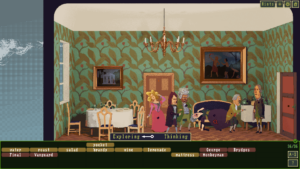The Case of the Golden Idol
 The Case of the Golden Idol is a grisly little story in the Weird Tales genre, half murder mystery and half supernatural horror, set in a world of Georgian-era caricature. I had been putting off starting it because I didn’t feel up to starting another large, information-intense game while I still have the likes of Deus Ex to get back to (and I will get back to it, soon), but in fact it turns out to be reasonably short, and what’s more, segmented. It’s been frequently compared to Return of the Obra Dinn for its fill-in-the-blanks gameplay, its investigation by examining static tableaux, and probably even its time period, but where Obra Dinn was all one big puzzle, Golden Idol is a series of vignettes, with only the finale reaching beyond its boundaries in any significant way.
The Case of the Golden Idol is a grisly little story in the Weird Tales genre, half murder mystery and half supernatural horror, set in a world of Georgian-era caricature. I had been putting off starting it because I didn’t feel up to starting another large, information-intense game while I still have the likes of Deus Ex to get back to (and I will get back to it, soon), but in fact it turns out to be reasonably short, and what’s more, segmented. It’s been frequently compared to Return of the Obra Dinn for its fill-in-the-blanks gameplay, its investigation by examining static tableaux, and probably even its time period, but where Obra Dinn was all one big puzzle, Golden Idol is a series of vignettes, with only the finale reaching beyond its boundaries in any significant way.
And that means the vignettes can differ significantly in their content. The UI for solving a scene is always basically the same, involving dragging words found in the scene 1Sometimes the word is used in the scene in a way completely unrelated to its use in the solution, which strikes me as a bit cheap. into empty slots in various texts and diagrams, but exactly what you’re completing this way is highly contextual. The first several scenes are heavily concerned with identifying all the characters involved, but later chapters drop this. Every vignette contains at least one death, but this is kind of incidental; unlike Obra Dinn, where the deaths are an essential part of the mechanics of how the story is revealed to the player character, Golden Idol doesn’t even have a player character. The player is simply external to the story.
That point is worth expanding on. So much thought on narrative in games simply assumes that the player has to take on a role within the story, through with to interact with it, and Golden Idol is a sterling example of a game that’s entirely focused on narrative but which simply doesn’t do that. And it’s not simply a matter of playing a character who isn’t depicted onscreen. The player has a vantage point that would be impossible for any in-world character, with access to everything, able to inspect the contents of locked containers, sometimes even able to see characters’ private thoughts. Not quite an omniscient narrator, because even though you’re all-seeing, you’re very much not all-knowing. It’s a bit like the naïvist interaction in Samorost and other Amanita Design games. Fitting with this view, although the tableaux are more or less moments frozen in time — one of them depicts an explosion! — they can contain sequential elements like dialogue. It’s similar to how actions are depicted in comics, really: it doesn’t make perfect logical sense, but it’s understood at a gut level, and that’s enough. (The non-realistic art style might be of help in getting player into the right mindset.)
I’ve commented before on how one of the strengths of interactivity of storytelling is that it can make progress in the story contingent on the player actually understanding things. In Golden Idol, that’s basically the entirety of the gameplay. You’re given a bunch of information, much of it visual, and in order to proceed to the next scene, you have to demonstrate that you understand the implications. But it’s not quite as simple as that makes it sound. For one thing, it isn’t just the information in the scenes that’s guiding you to the answers, but the questions themselves, letting you know what details are important by what kind of things they track. Sometimes I thought I understood everything that was going on, but the mere fact that I hadn’t filled in all the blanks let me know there were gaps in my understanding. For another thing, there are gaps even in what’s asked. Sometimes the game only gives you the words to identify someone by a title or a pseudonym, but you can figure out who they really are by reading between the lines. Only in the very end does the game force you to make all the connections, and when you do, it comes as a revelation, even though you had all the necessary information already. It’s basically doing the opposite of what bothered me about Sherlock Holmes Consulting Detective.
| ↑1 | Sometimes the word is used in the scene in a way completely unrelated to its use in the solution, which strikes me as a bit cheap. |
|---|
 Comments(0)
Comments(0)